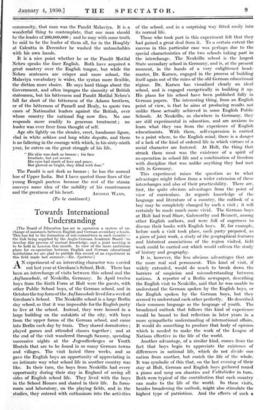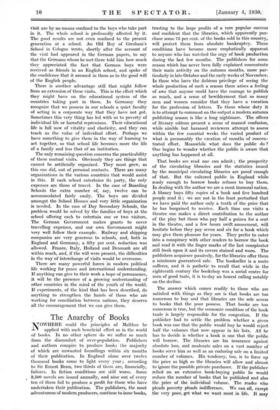Towards International Understanding
[The Board of Education has set in operation a system of ex- change of assistants between English and German secondary schools. This as led to the formation of sub-committees in each country— the link being supplied by the Anglo-German Academic Board—to develop this process of mutual knowledge, and a joint meeting is to be held in London this month. In view of the more ambitious plans for co-operation between English and German educational institutions we are glad to publish this record of an experiment in this field niade last sumnier.—En. Spectator.] • AN experiment of an interesting character Was carried out last year at Gresham's School, Holt. There has been an interchange of visits between this school and the Aufbauschule, of Neukolln, Germany. In April twelve boys from the Sixth Form at Holt were the guests, With other Public School boys, of the' German school, and in October the top form of the Aufbauschule lived for a week at Gresham's School. The Nenkolln school is a large Berlin day school, so that it was impossible for the English party to live at the school. Instead, they were housed in a large building on the outskirts of the city, with boys from the' upper forms of .the German school, and came into Berlin each day by train. They shared dormitories ; played games and attended classes together'; and at the end of the visit wandered through Saxony, spending 'successive nights at the Tagendherbergen or Youth Hostels that are to be found in so many German towns and villages. The visit lasted three weeks, and so gave the English boys an opportunity of appreciating in an intimate way what school life in another country was like. In their turn, the boys from Neuktilln had every opportunity during their stay in England of seeing all sides of English School life. They lived with the boys in the School Houses- and shared in their life. In form- rooM and laboratory, on the playing fields, and in the studies, they entered with enthusiasm into the activities of the school, and in a surprising way fitted easily into its normal life.
Those who took part in this experiment felt that they had gained a great deal from it. To a certain extent the success in this particular case was perhaps due to the special characteristics of the two schools taking part in the interchange. The Neulofolln school is the largest State secondary school in Germany, and is, at the present moment, in the hands of a very enlightened head- master, Dr. Karsen, engaged in the process of building itself again out of the ruins of the old German educational regime. Dr. Karsen has visualized clearly an ideal school, and is engaged energetically in building it up. His plans for his school have been published fully in German papers. The interesting thing, from an English point of view, is that he aims at producing results not unlike those actually achieved in some English Public Schools. At Neukolln, as elsewhere in Germany, they are still experimental in education, and are anxious to learn what they can from the experience of English educationists. With them, self-expression is carried to a point where, to the English mind, there is a danger of a lack of the kind of ordered life in which virtues of a social character are fostered. At Holt, the thing that struck them most was the existence of a spirit of co-operation in school life and a combination of freedom with discipline that was unlike anything they had met with in Germany.
This experiment raises the question as to what advantages might follow from a wider extension of these interchanges and also of their practicability. There are, first, the quite obvious advantages from the point of view of curriculum. As regards knowledge of the language and literature of a country, the outlook of a boy may be completely changed by such a visit ; it will certainly be made much more vivid. The German boys at Holt had read Shaw, Galsworthy and Bennett, among other English authors, and were full of eagerness to discuss their books with English boys. If, for example, before such a visit took place, each party prepared, as a piece of joint work, a study of the geographical features and historical associations of the region visited, field work could be carried out which would enliven the study of history and geography.
It is, however, the less obvious advantages that are the more real and permanent. This kind of visit, if widely extended, would do much to break down the barriers of suspicion and misunderstanding between nations. A reporter of a Berlin newspaper, describing the English visit to Neuk011n, said that he was unable to understand the German spoken by the English boys, or the English spoken by the German boys, but they seemed to understand each other perfectly. He described their common language as the language of youth. The broadened outlook that follows this kind of experience would be bound to find reflection in later years in a more sympathetic understanding of international affairs. It would do something to produce that body of opinion which is needed to make the work of the League of Nations effective in the life of the world.
Another advantage, of a similar kind, comes from the fact that boys begin to appreciate the existence of differences in national life, which do not divide one nation from another, but enrich the life of the whole. It was symbolic of this that, on the last evening of their stay at Holt, German and English boys gathered round a piano and sang sea shanties and Volkslieder in turn. Both were typical of the contribution that each country can make to the life of the world. So these visits, besides broadening the outlook, might also stimulate the highest type of patriotism. And the effects of such a visit are by no means confined to the boys who take part in it. The whole school is profoundly affected by it. The good results are not even confined to the present generation at a school. An Old Boy of Gresham's School in Cologne wrote, shortly after the account of the visit had appeared in the German papers, to say that the Germans whom he met there told him how much they appreciated the fact that German boys were received as friends in an English school, and. spoke of the confidence that it aroused in them as to the good will of the English people.
There is another advantage still that might follow from an extension of these visits. This is the effect which they might have on the educational system of the countries taking part in them. In Germany they recognize that we possess in our schools a quiet faculty Of acting in a corporate way that they have not got. Sometimes this very thing has led with us to poverty of individual life or harmful repressions. Their educational life is full now of vitality and elasticity, and they can teach us the value of individual effort. Perhaps we have something to give them in the way of learning to act together, so that school life becomes more the life of a family and less that of an institution.
The only remaining question concerns the practicability of these mutual visits. Obviously they are things that cannot be artificially organized. They must grow, as this one did, out of personal contacts. There are many organizations in the various countries that would assist in this. If each school entertains its party, the only expenses are those of travel. In the case of Boarding Schools the extra number of, say, twelve can be accommodated fairly easily. The boys are divided amongst the School Houses and very little organization is needed. In the case of Day Secondary Schools, the problem would be solved by the families of boys at the school offering each to entertain one or two visitors. The German Government makes grants to cover travelling expenses, and our own Government might very well follow their example. Railway and shipping companies are very generous to schools, and, both in England and Germany, a fifty per cent, reduction was allowed. France, Italy, Holland and Denmark are all within reach, and, if the will were present, the difficulties in the way of interchange of visits would be overcome.
There are many powerful forces in modern political life working for .peace and international understanding. If anything can give to their work a hope of permanence, it will be the presence of a growing understanding of other countries in the mind of the youth of the world. If experiments, of the kind that has been described, do anything to strengthen the hands of those who are working for conciliation between nations, they deserve all the encouragement that we can give them.











































 Previous page
Previous page